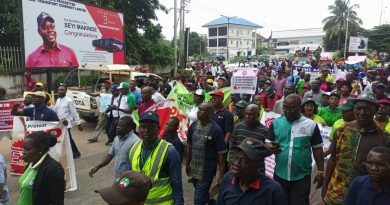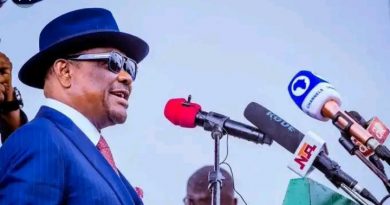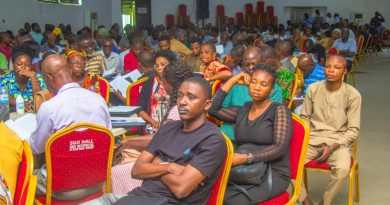WHAT OSINBAJO’S PRESIDENCY PROMISES
By Azeem Oladimeji Salako
There are insinuations whether Vice President Yemi Osinbajo will contest the position of President of the federal republic of Nigeria in 2023. Before now elections in Nigeria are driven and won by ethno-religious sentiment enforced with eliciting the emotions of the populace.
Therefore little concern has been allotted to the fundamental philosophy that should necessarily drive governance, and the inseminating discipline requisite for its delivery.
Another quagmire is which that has impinged the nation’s foreign policy. The national objectives are guided by uncoordinated visions leading to Nigeria’s experience of constant foreign policy instability under successive administrations.
The accomplishment of these concerns if to be applied in the process of recruiting the next president of Nigeria point at Professor Yemi Osibanjo as the most qualified individual to hold the baton of leadership.
Historical Brief of Nigeria’s Leadership Recruitment Since 1999
We may attempt a brief trajectory into the approach being considered for choosing the president of Nigeria. Perhaps helpfully one can appreciably observe the development in the current political system, and it may equally guide our prospect and prediction as we sprawl into the coming election year.
In May 29th 1999, former president Olusegun Obasanjo became president of Nigeria to allay the conspiracy theory levelled against the Northerners on the death of MKO Abiola, a foremost Yoruba man, whose election as president of Nigeria under SDP was annulled with later insinuation of being killed to sustain the Northern hegemony in the nation’s national politics. For whatever reason the Northerners unanimously zoned the presidency to the Southwest in 1999 with having the two presidential candidates, Olusegun Obasanjo (PDP), and Olu Falae (AD and APP) from the Yoruba region of Nigeria.
However Obasanjo was considered perhaps for his military experience which was materially in need to contain further military incursion in politics. He proved this through his several civil-military relations policy; the forceful retirement of some notorious military officers, political appointment of retired military officers, and preferential recruitment of service chieftains. Alas, the administration of Obasanjo did not only introduced prebendal politics to the nation’s nascent democracy, he institutionalized and plummeted it into a patrimonial state.
The 2007 election then beckon on the most incorruptible Governor to restore democratic order, at that time, it could be no other person than a perceived gentle and incorruptible late president Umaru Yaradua. Although how an incorruptible person consented and assented to a corruptible process for his election victory further rejigged the need to reexamine the definition of corruption.
His death nonetheless plunged Nigeria into a lucky and accidental president in person of President Jonathan and whose continued tenure coincide with the global recession. The index of poverty became outrageous, the kernel of governance was left with the option to alleviate poverty, and raise the standard of living. This campaign elicited emotions as the best fight against poverty, at least according to populist idea, can only be done through a foremost and erstwhile poor man, in our case, a man who has no shoe.
President Jonathan did not only buy for himself innumerable shoes, he equally opened an exquisite shoe boutiques for Asari Dokubo, Tompolo, Gani Adams and their gangs. He further built, nurtured, and strengthened militia groups, his administration granted amnesty to deadly militants, and further abused a state pardon to celebrate his former capon. This completed the destruction of Nigeria and acted as buoy to the bellicose fundamentalists -Boko Haram group. It also popularized kidnapping as a venture, sprawling up to the Northern sphere to complete the anarchy and pariah condition of the Nigeria state as pronounced worldwide. It was this catastrophic situation of Nigeria’s insecurity that led to the consideration of electing a former and disciplined warrior in the person of President Muhammad Buhari.
So if duly introspected, the synopsis of leadership recruitment in Nigeria since 1999 illustrate two things. Firstly, successive leaders have emerged through the tactics of emotional fraud and not necessarily based on prospect, capacity, or competence to deliver, secondly, they have all compounded and created specific problem as a tactics to recruit and anoint a perceived expertise. This process has beclouded the possibility of having visionary leaders and it has regrettably not paved way for a political culture beyond a cult of choosing leaders through emotions.
Without a doubt the administration of Buhari has done tremendously well in fighting the inherited insurgency, he has further reinvigorated the agricultural sector, through which he has increased the nation’s exportation, investment in building of infrastructure, with an ongoing effort to renewing the sustainable development goal agenda. In this wise, the 2023 presidential election will mark a watershed in the electoral history of Nigeria. It will bring little or no emotional voting tactics. The ballot will focus on governance ideologies and the capacity to strengthen the gains of the country since 2015.
DOES OSINBAJO FIT IN TO THE NIGERIAN DREAM?
Since the cradle of Nigeria’s nascent democracy, the country under the Buhari’s government for the first time move toward what can be qualified in the local context as a governance philosophy, and regarded internationally as foreign policy doctrine. Ironically this is happening the first time a supposed and purported vision is not set by a president.
Historically speaking, successive administrations whether during their political campaigns or at the threshold of their government had announced their prophetic visions for Nigeria, even daringly with a timeframe, alas it turned out that these visionaries foresaw nothing, or misdirected by their prophets, or their periscopic lenses were impaired, or perhaps what they referred as visions were merely demagogueries that none of their superfluous visions had become realizable.
We can now say confidently notwithstanding the abyss of inherited security challenges which of course the government is fighting both sincerely and aggressively that there is a governance direction in Nigeria; investment in infrastructure, human capital, and sustainable development goal which comprehensively include many things such as creative arts, empowerment, employment, socio-economic interventions etc. In the international domain the government has provably centered the thrust of Nigeria’s foreign policy on; Afrocentric and Liberalization.
Thus the preoccupying concern while the 2023 election come forth is to examine and cross-examine whoever that ambitioned to be the occupier of the seat of the president of Nigeria after Muhammadu Buhari. The major question is their subscription to the newly devised national philosophy, the values that can be added, how entrenched is their commitment to critique the shortcomings, capacity to build on the gains, and their competence to amenably confront new problems. These are the questions from which the answers to them point at one person, the Vice president Professor Yemi Osinbajo.
Looking at the March 8th Initiative, a brainchild of the “Friends of Prof” organized to inspire and promote communal, entrepreneurial and public spirited endeavors within Nigeria in honor of the birthday of His Excellency, Prof. Yemi Osinbajo, SAN, GCON. It is instructive to note that this article is neither to praise, nor examine the quality of this laudable initiative, rather the aim is to introspect into the business categories of the beneficiaries, then make a deduction with respect to why the what was selected.
The program was delineated into five (5) stratums; business challenge, my business support category, my catalyst support challenge, my bold Innovation challenge, and health reward grant with a total of thirty-three thousand and twenty-eight applications, whereby a total number of 355 applicants were shortlisted as winners of the entrepreneurship grants.
Looking at the winners list, and according to their business categories, the statistics shows that 39.5 percent were agriculturalists, 28.8 percent were from technology and technical field, 15 percent drawn from the creative arts, 12.7 percent in health, and 4 percent from other sectors. These statistics when brought side by side to Buhari’s governance philosophy reveals a strong and positive relationship, thereby putting Osibanjo as the best choice to be considered to succeed President Muhammad Buhari come May 29th 2023, as president of the federal republic of Nigeria. It is equally significant as a hindsight into what Prof. Yemi Osibanjo’s presidency promises, broadly speaking are investment in; Agriculture, Infrastructure, Technology, Creative Art, and Health. It is evident that these fundamentals can only be assured through quality education, while they serve as requisites to ensure good security being the hallmark of a nation’s sovereignty.
Conclusively I have said it somewhere that the vision of a political leader should not be isolated to the prospect of the society he plan to rule. In essence, vision beyond sensationalism should necessarily be driven and measured by both the capacity and vitality of the qualities and endowments found in a state jurisdiction. Unfortunately, the reverse has been the case in Nigeria, most visionary leaders will fall if evaluated on the basis of the nation’s prospect. Need I say that the albatross of Nigeria partly are debilitating visions that minimizes her advantage and maximizes the disadvantage. The way out is to elect a teleological leader, the one whose vision is a full representation of the nation’s prospect, and one who his vision goad the will and how to translate this prospect to prosperity.
Azeem Oladimeji Salako is a political scientist and Director at Caso Metropolitan College.




